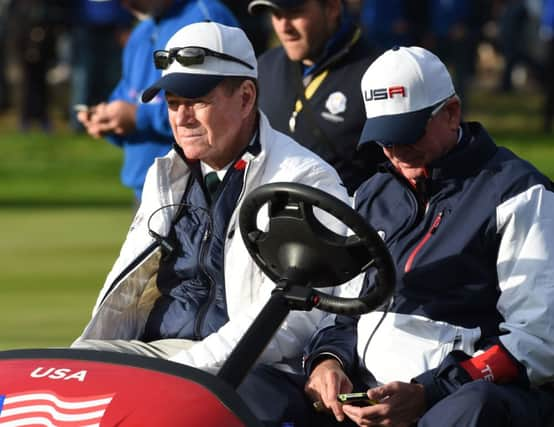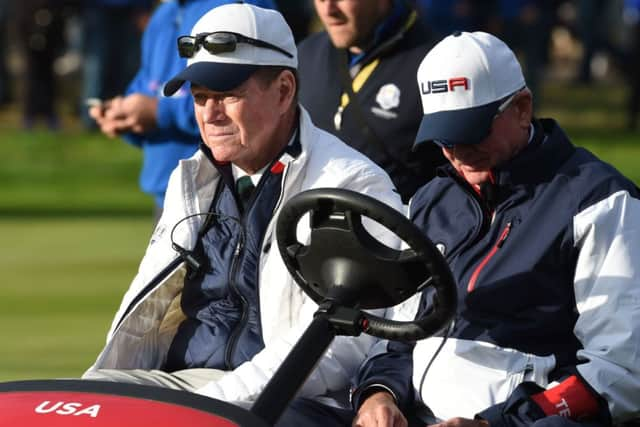Ryder Cup 2014: Mickelson clips Watson’s wings


“They’re Richardson’s geese. Smaller than Canadian geese and they also have a higher register.” Who was this kind soul offering such titbits of ornithological information in the middle of a high-octane golf tournament? Why, it was none other than Tom Watson.
The American skipper will surely have wanted to fly to warmer climes on many occasions over the last few days in Perthshire. However, surely this feeling was no more intensely felt than last night, as he sat, visibly shrinking in his seat, while Phil Mickelson took aim at what he perceived to be the legendary golfer’s failings as a Ryder Cup captain.
Advertisement
Hide AdAdvertisement
Hide AdWatson will not want anyone to have felt sorry for him. He is a tough old cove, which might jar with his lovable image. This wasn’t a case of Bambi being shot. But this was not how we expected his Ryder Cup reign to end. This was not the way we wanted him to go. Not here, not in Scotland, where he is loved by the galleries, and where he will – one hopes – still want to return next year, to compete in his last-ever Open. He had to interrupt his typically gracious captain’s speech to plead for silence as Scottish fans sang his name. It’s possible there won’t be such adulation for Watson in America this week, particularly in the Mickelson household.


Last week Watson spoke of wanting to target specific European golfers. He would not have expected to be brought down by one of his own. Certainly not in the setting of a packed press conference, with even hard-bitten journalists sitting slack-jawed in front of them.
“We had a game plan,” said Mickelson. “We were invested in the process,” he added. He was not talking about Watson’s leadership skills, however. Paul Azinger, the successful US skipper from 2008, was the stick Michelson used to club Watson, who stared straight ahead. As we scuffed our way down the lane on Saturday night having watched Watson endure another uncomfortable press conference, reporters were united in one thought: why on earth is he putting himself through this? Surely a 65-year-old with nothing to prove to anyone should not be having to sit and justify himself so late on a Saturday night?
“I’ve been waiting for this call for almost 20 years,” is one of the quotes written in huge letters on the canopy of a stand at the first tee. It surely hasn’t been as enjoyable as Watson had hoped. Golf has changed. Society has changed. Watson isn’t used to being urged to dance by a boisterous crowd, as he was at the first tee yesterday. Jack Nicklaus greeted several of the competitors as they made their way to the start. However, he seemed to be most comfortable talking to his old friend Watson, who perhaps craved having only such non-taxing ambassadorial chores to worry about. Instead, he was figuring out how the US were going to peg back a four point deficit in the singles. As you now know, they didn’t. Which means there had to be some blood-letting.
Although Watson is nine years younger than Nicklaus, he is still closer in vintage to the world’s greatest golfer than anyone in a team he failed to inspire over the last few days at Gleneagles. At 65, Watson is 21 years older than his two most senior players, Mickelson and Jim Furyk. He is 40 years older than Patrick Reed, and he has 44 years on his youngest charge, the exciting Jordan Spieth. Curiously, although many wondered if he could inspire those who were not born by the time he was dueling in the sun with Nicklaus, never mind remember it, he actually seemed to strike up a better relationship with Spieth and Reed than he did with others in the team. Even last night, it was Spieth who treated Watson with the most respect, referring to him as “Captain” throughout last night’s press conference, like the pupils in Robin Williams’ classroom in Dead Poets Society. Not so Mickelson, the lefty who we now know is the meanest southpaw in golf.
“We arrive united and we depart united,” said Watson at the closing ceremony. But it’s clear they don’t. The most thunderous shots across Watson’s bows came not from his young bucks, but from Mickelson. There was a minor warning of what might unfold in the losers’ press conference when Mickelson referenced Azinger’s winning captain’s performance six years ago in an interview with a US television channel.
However, no-one expected Mickelson to return to this theme quite to brutally, when in the presence of Watson. Perhaps we must give him credit for his honesty when he was asked, quite innocuously it seemed, to put his finger on what went right at Valhalla and what hasn’t gone right since. “Say what we feel, not what we ought to say,” as William Shakespeare put it, in the closing lines of King Lear. This was pure theatre. All the big themes were here – disloyalty, treachery. Even the infirmity of age. This wasn’t one of Mickelson’s criticisms. Rather, it was used by Watson to explain why Mickelson had not played on Saturday, despite an apparent text from the player pleading with the skipper to change his mind. Watson wasn’t for turning. He thought Mickelson was tired. Does he regret it now? “I put some players in there I thought could put the ball in the fairways maybe a little bit better,” said Watson. We will take that as a no, then.
Very deliberately it seems, Mickelson had chosen a seat furthest away from Watson. They barely looked at each other. Some may wonder whether journalists have the sensitivity required to squirm. They do. “Team USA, thank you for your time,” said the invigilator, as he wrapped-up one of the most extraordinary press conferences in recent memory. “Safe journey home.”
Perhaps Watson had reason to think wistfully of those geese once more, flying in formation.